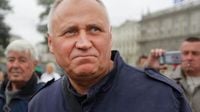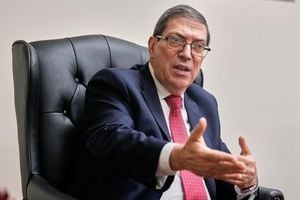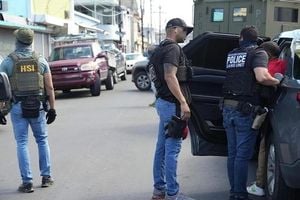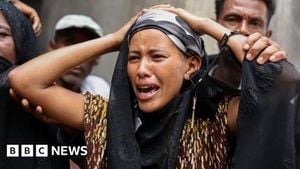On September 11, 2025, as a bus carrying pardoned Belarusian political prisoners idled at the Kamenny Loh border crossing, Mikalai Statkevich, a gaunt 69-year-old opposition leader, made a split-second decision that would reverberate far beyond the no-man’s-land between Belarus and Lithuania. Rather than accept what he called a "forced deportation" as part of a U.S.-negotiated deal, Statkevich stood up, forced open the bus door, and stepped off, leaving behind his desperately needed heart medication—and, moments later, his freedom.
According to The Associated Press, Statkevich’s act defied the script written by President Alexander Lukashenko, Belarus’s authoritarian ruler, who had pardoned 52 political prisoners in a move widely seen as a diplomatic gesture to the West. The release, which followed an August phone call between Lukashenko and U.S. President Donald Trump, was part of an arrangement that eased sanctions on the Belarusian national airline Belavia, allowing for resumed parts supplies and aircraft servicing.
But Statkevich, a veteran of Belarus’s battered opposition, saw the offer as a thinly veiled attempt to cleanse the country of dissenters by sending them into exile. "I won’t allow myself to be sold or for someone to decide where I live—or where I die," he declared to fellow prisoner Maksim Viniarski, who later recounted the moment to AP. Viniarski, himself a former political prisoner, described Statkevich as "determined—ready to fight not only for himself, but for the freedom of all Belarusians."
Statkevich’s refusal triggered a tense standoff. For hours, he remained in the border’s liminal zone, watched by cameras and officials. Eventually, surveillance footage captured six masked security operatives escorting him back into Belarus. Since then, Statkevich has vanished from public view, and his fate remains shrouded in uncertainty.
President Lukashenko later confirmed, in his typically terse style, that Statkevich was back in Belarus: "He’s our citizen after all." But he offered no further details—a silence that has only deepened the alarm of human rights groups and Statkevich’s family. His wife, Maryna Adamovich, rushed back to Belarus from abroad and attempted to visit the prison colony in Hlybokaye, where he had previously been held. Officials refused to confirm his presence or condition. "The abuse continues. Trying to deport Mikalai, given his character, was a pointless undertaking," Adamovich said, echoing her husband’s words: "They’re deporting patriots. I won’t go. What will happen to the country?"
Statkevich’s health is a particular concern. He suffered a heart attack in prison and, since February 9, 2023, had been held in total isolation—no contact with the outside world. The heart medication he left behind on the bus is, by all accounts, critical to his survival. Adamovich fears for his life, but insists that "neither illness nor years of solitary confinement had broken his will."
The parallels to 2020 are striking. That year, Maria Kolesnikova, another opposition leader, became a symbol of resistance when she tore up her passport at the border to avoid deportation—an act that landed her an 11-year prison sentence on charges of "conspiracy to seize power." Statkevich’s refusal to leave is seen by many as a similar act of defiance, one that underscores the high stakes and personal risk for those who challenge Lukashenko’s rule.
International reaction has been swift and pointed. United Nations experts have described Statkevich’s case as one of enforced disappearance and arbitrary detention. "There are solid reasons to believe that Statkevich is a victim of enforced disappearance and arbitrary detention," they said, according to the U.N. human rights office. "We call on Belarus to provide information about his fate and whereabouts, as well as on his state of health." Pavel Sapelka of the Viasna human rights group, which tracks political prisoners in Belarus, noted that it remains unclear whether authorities have filed new charges against Statkevich despite his presidential pardon.
Opposition leader Sviatlana Tsikhanouskaya, speaking to AP, condemned Lukashenko’s tactics: "Lukashenko is trading political prisoners like commodities, releasing some and imprisoning other activists in their place. I respect Statkevich’s principled decision and choice to remain in the country, but this highlights the problem—Belarusian political prisoners are not being released but forcibly deported to other countries against their will."
Lukashenko, often dubbed "Europe’s last dictator," has ruled Belarus for over three decades, repeatedly winning elections dismissed by Western observers as neither free nor fair. The aftermath of the disputed 2020 election saw hundreds of thousands take to the streets, only to be met with mass arrests, beatings, and the shuttering of independent media and civil society groups. According to Viasna, around 1,200 political prisoners remain in custody, including Nobel Peace Prize laureate Ales Bialiatski, and reports abound of harsh detention conditions, denial of medical care, and isolation from families.
Statkevich’s own history is emblematic of the Belarusian opposition’s resilience—and suffering. Arrested before the 2020 election and sentenced to 14 years for organizing mass unrest, he was labeled an "extremist" in 2022, a designation commonly deployed against government critics. Since the 1990s, he has been imprisoned three times, accumulating over 12 years behind bars. Amnesty International has recognized him as a prisoner of conscience on three separate occasions.
His political career stretches back to the early days of Belarusian independence. A former military officer, Statkevich helped organize the "March of Freedom" in 1999 to protest a proposed union with Russia. He was sentenced to restricted freedom for organizing rallies against the 2004 referendum that allowed Lukashenko to extend his rule. In 2010, Statkevich ran for president, challenging Lukashenko directly—a move that led to nearly five more years in prison. He is the founder of the Belarusian Social Democratic People’s Hramada party, affiliated with the Socialist International, and was among opposition leaders awarded the European Parliament’s Sakharov Prize for Freedom of Thought.
For those who know him, Statkevich’s latest act of resistance comes as no surprise. "Statkevich exemplifies the resilience and courage of a politician forced to work under a dictatorship," Viniarski told AP. "Statkevich has reiterated that our values are worth exactly what we are willing to pay for them."
As the world watches and waits for answers, Statkevich’s disappearance stands as a stark reminder of the risks faced by those who dare to challenge autocracy in Belarus. His fate now hangs in the balance—a symbol of both the country’s unresolved struggle for democracy and the personal cost of standing up to power.





